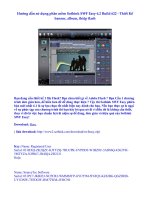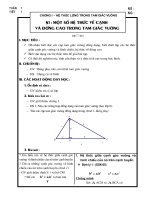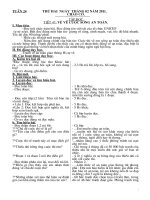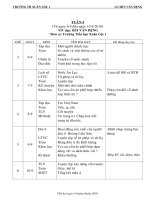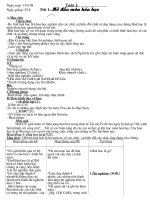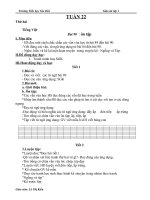Tài liệu Just a Job? Communication, Ethics, and Professional Life pptx
Bạn đang xem bản rút gọn của tài liệu. Xem và tải ngay bản đầy đủ của tài liệu tại đây (1.11 MB, 309 trang )
Just a Job?
This page intentionally left blank
Just a Job?
Communication, Ethics, and
Professional Life
George Cheney, Daniel J. Lair,
Dean Ritz, Brenden E. Kendall
3
2010
1
Oxford University Press, Inc., publishes works that further
Oxford University’s objective of excellence
in research, scholarship, and education.
Oxford New York
Auckland Cape Town Dar es Salaam Hong Kong Karachi
Kuala Lumpur Madrid Melbourne Mexico City Nairobi
New Delhi Shanghai Taipei Toronto
With offi ces in
Argentina Austria Brazil Chile Czech Republic France Greece
Guatemala Hungary Italy Japan Poland Portugal Singapore
South Korea Switzerland Thailand Turkey Ukraine Vietnam
Copyright © 2010 by Oxford University Press, Inc.
Published by Oxford University Press, Inc.
198 Madison Avenue, New York, New York 10016
www.oup.com
Oxford is a registered trademark of Oxford University Press.
All rights reserved. No part of this publication may be reproduced,
stored in a retrieval system, or transmitted, in any form or by any means,
electronic, mechanical, photocopying, recording, or otherwise,
without the prior permission of Oxford University Press.
Lyrics on page 101 by Bob Dylan. Copyright ©1964; renewed 1992 Special Rider Music.
All rights reserved. International copyright secured. Reprinted with permission.
Library of Congress Cataloging-in-Publication Data
Just a job? : communication, ethics, and professional life /
George Cheney . . . [et al.].
p. cm.
Includes bibliographical references and index.
ISBN 978-0-19-518277-4; 978-0-19-518278-1 (pbk.)
1. Occupations. 2. Professional ethics. 3. Success.
I. Cheney, George.
HF5381.J87 2009
174—dc22 2009008674
1 3 5 7 9 8 6 4 2
Printed in the United States of America
on acid-free paper
To the end of ethics as work
This page intentionally left blank
Acknowledgments
We are grateful to our colleagues, including Cliff Allen, Karen Lee
Ashcraft, Kirsti Broadfoot, Connie Bullis, Dana Cloud, Lars Thøger
Christensen, Charles Conrad, Stan Deetz, Shiv Ganesh, Rebecca Gill,
Sasha Grant, James Hedges, Alison Henderson, Richard Johannesen,
Tim Kuhn, Jill McMillan, Mette Morsing, Debashish Munshi, Majia
Nadesan, Erin Ortiz, Juliet Roper, Matt Seeger, Mary Simpson, Cynthia
Stohl, Katie Sullivan, Nikki Townsley, Sarah Tracy, Angela Trethewey,
Roy Wood, Heather Zoller, and Ted Zorn, for their ideas, inspiration,
and collaboration in professional ethics and related areas. We express
deep thanks to Steve Goldzwig and Steve May for their careful
reviews of the entire manuscript over the 2008–09 holidays. Thanks
also to Helen Gamble for hosting an authors’ retreat in September
2008, and to April Kedrowicz for helping us understand the engi-
neering profession. Our editors at Oxford University Press, especially
Catherine Rae, John Rauschenberg, and Brian Desmond, have been
patient and helpful from start to fi nish. Our copy editor, Jackie Doyle,
did a superb job! Finally, we express deep appreciation to our partners
and families. George thanks Sally Planalp; Dan is grateful to Danielle
De La Mare; Dean honors Carol Volpe; and Brenden dedicates his
work on this project to his brother, Grant Kendall, and his parents,
Mark and Roseann Kendall, for their inspiration and support.
This page intentionally left blank
Contents
Introduction 3
1 (Re)Framing Ethics at Work 21
2 Starting Conversations about Professional Ethics 49
3 Working for a Good Life 95
4 Being a Professional: Problems and Promises 123
5 Reconsidering Organizations as Cultures of Integrity 159
6 Seeking Something More in the Market 197
7 Finding New Ways to Talk about Everyday Ethics 229
References 261
Index 289
This page intentionally left blank
Just a Job?
This page intentionally left blank
3
Introduction
The problem facing [the world] is the separation of the econ-
omy from society and the absence of any effective regulation of
the market place. . . . [T]he critical issue is the absence of a set of
professional ethics. (Turner, 1996 , pp. xxxi–xxxii)
Why We Wrote This Book
Probing “Morality” and Prodding “Ethics”
Sometimes a word is worth a thousand words. Or an entire book.
“Ethics” is one of those words, with no shortage of book-length treat-
ments. The idea for a communication-centered investigation of ethics
and its relationship to professional life arose during the opening ses-
sion of George’s ethics class in the spring of 2003. Although the stu-
dents weren’t terribly excited by the idea of ethics, they became much
more animated when the discussion shifted to the term “morality.”
They saw the latter term as more relevant to their lives, includ-
ing work. In fact, many of these same students shared an implicit
assumption that doing ethics is a kind of work —work in a pejorative
sense. Was this merely a game of semantics? Or was it in fact more
revealing? Further classroom discussion about the meanings students
associated with each of those two labels proved very informative.
A number of the students associated ethics with chores that were far
from captivating. They suggested that ethics were dry, abstract, were
suggestive of “don’ts” rather than “do’s,” and were unrelated to their
just a job?
4
everyday lives, including their careers. Talk of morality, on the other
hand, got the students visibly excited: they recognized the promi-
nence of the term in contemporary public discourse in the United
States concerning everything from politics to entertainment; they
also commented on the link to religion, values, and deep personal
concerns. This single classroom episode said a lot, not only about the
students but also about contemporary public discourse. The fact is
that morality has come to trump ethics as a label: “(im)moral” has
become more rhetorically compelling than “(un)ethical.” In our eve-
ryday discourse we often consider moral questions without refer-
ence to ethics at all. As we will discuss throughout this book, the way
we frame such issues, broadly speaking, has implications for which
issues will be addressed, how salient they will be, and how they will
be evaluated (Kellaris, Boyle, & Dahlstrom, 1994 ).
For us, of course, this classroom discussion is about much more
than a preference for one term over another. It reminds us of the
importance of how we talk about ethics—both with respect to specifi c
issues (such as deception or confi dentiality) and in terms of how we
frame or approach ethics (or professional ethics) in general. That is,
what sorts of things do we associate with ethics? Where do we posi-
tion ethics vis-à-vis other dimensions of our lives? To which domains
of activity do our ethical principles apply? When do we “locate” eth-
ics in a distant place that we visit only occasionally, rather than as
something integral to our day-to-day lives? In which situations do we
call others’ attention to ethics? What do we mean when we describe
someone else as “an ethical person”? What does it mean for an organi-
zation or a profession to have integrity? How is trust central to the
effective functioning of the market and, indeed, how does it refl ect
the health of our economy in general? (On the burgeoning interest in
trust research, see Lewis & Einhorn, 2009 .) Language, visual imagery,
and communication in general are of great importance for ethics, as
we will see. Now, let’s consider why some people are paying greater
attention to the study of ethics at work today, and just how they are
talking about it. None of this is to suggest that symbols are every-
thing, or that rhetoric is the whole of reality. Still, we will show how
words and images make real practical differences in our pursuit of
ethical grounding for a good life.
Appreciating the Power of Language
It is common to dismiss language or even visual images as being
superfi cial, as not the “real stuff”: by now, we are used to national
introduction
5
political campaigns bombarding us with sound bites and spectacu-
lar images; yet, we are just as accustomed to denying their impor-
tance. Consumers regularly exhibit this tendency, when they report
that individual ads don’t affect them ( The Ad and the Ego , 1999). At a
certain level, though, we know their belief is false, or at least begs
refi nement. We can cite an array of examples from politics, business,
religion, and other domains of our lives to demonstrate that what we
often casually dismiss as “mere rhetoric” instead has powerful practi-
cal consequences. We would even reverse the question to this effect:
action without talk should be as suspect as talking without action.
For instance, as the social critic Slavoj Žižek ( 2008 ) observed after the
global fi nancial meltdown of October, 2008, it might have been help-
ful to upend the old adage to this effect: “Don’t just do something:
talk” rather than adopt quick fi xes with little deliberation.
And so, we might ask, Who gets accorded the status of “leader,”
“hero,” “star,” “high performer,” “visionary,” “celebrity,” “guru,”
and the like? In terms of ethics and morality, what practical differ-
ences do these word choices make? And why should we be concerned
with such labels at all? This is precisely why the debate between the
Democratically controlled U.S. Congress and the Republican admin-
istration of President Ronald Reagan in the 1980s amounted to far
more than word play: to call the opposition forces in Nicaragua “free-
dom fi ghters” was to invoke the United States War of Independence
and call for support; to term them “rebels” was to tie them implicitly
to the losers in the U.S. Civil War and to suggest that they, who in
this case called themselves “Contras,” were not worthy of outside
help. Today’s often bitter debate over “undocumented workers,” also
called “illegal immigrants” or “illegal aliens,” in the United States
and elsewhere, has a similar dynamic, although the debate is not as
clearly divided along party lines. Rather, the debate follows ideologi-
cal lines: those who want cheap labor prefer “workers”; and those
who fear the effect of foreign workers (or stoke fear of them) prefer
“illegal aliens.”
Ultimately, these and other distinctions are more than merely lex-
ical choices, conscious or not. In everyday conversation and in pub-
lic discourse, the promotion of one term over another often affects
policies, patterns of behavior, and the scope of consideration. For
example, consider how certain discussions—say, about new weapons
systems—are steered toward technical assessments (“Does it work?”)
rather than moral ones (“Is it right?”). We can apply the same logic
to new business initiatives: too often we ask only “How can we do
it?” rather than “Should we do it all?” The global fi nancial crisis that
just a job?
6
began in late 2007 also yielded the question, “ What , in the broadest
sense of the word, should we be doing?” Our language, our symbols,
set up screens through which we view the world: some aspects of the
world are inevitably featured, while others recede or are obscured
from view (Burke, 1966 ). Words can alternately narrow or broaden
our vision, just as optical lenses can do. Above all, the selection of
one label, one category, over another implicates choice and thus is as
much a matter of ethics as it is of fact. So it is with apparently techni-
cal terms, such as “effi ciency,” as it is with obviously value-oriented
terms, such as “trust.”
Engaging in Conversations about Ethics
When we move from the possibilities of language to the idea of con-
versations about ethics we can hear more clearly the ways we discuss
ethics—or fail to—in various settings and at various levels. When
we hear the word “conversation,” we usually think of people talking
one-on-one and face-to-face. And this is defi nitely one of the situ-
ations in which discussions of ethics are important. Think of cases
where we consult with a family member, colleague, or friend about
“the right thing to do.” But, we also think about what might be called
the larger conversation of ethics: not only about specifi c decisions but
also about the role of ethics in our society. In the case of the popu-
lar television program The Apprentice , for instance, the lessons about
ethics are not restricted to the specifi c decisions that characters or
contestants make but also include how the program, as an entire set
of messages, frames professional ethics as “just business.” This is just
one example in which the culture of ethics can be seen to extend far
beyond the experience of individuals, groups, or organizations to
point out the need to look for ethics in unusual places.
One of our purposes in writing this book is to promote such
wide-ranging conversations about ethics, but to do so in a way that
avoids as much as possible a rigid, formal treatment of ethical theo-
ries. Still, theory cannot be avoided altogether, as it inevitably informs
our understandings of ethics, even when we don’t notice it. Thus, as
we engage theory, we consider not only the key concepts of various
approaches but also how ethical commitments are understood from
each perspective. In this way, it is helpful to revisit ethical theories
and to connect them with folk or everyday ideas of ethical practice.
For instance, we call for a revival of Aristotle’s concept of eudaimonia ,
or fl ourishing, which brings together common notions of happiness
with the idea of living a deeply good life: what philosopher Robert
introduction
7
Solomon (e.g., 1999 ) liked to call “A Good Life” rather than “The
Good Life.” As we will show, the revival of virtue ethics and the pur-
suit of eudaimonia are as valuable to the average worker, professional,
executive, and consumer as to philosophers who spend time probing
the value of such principles.
In terms of our work lives, we often speak of the importance of
“being professional.” At the same time, we recognize that many kinds
of work and workers become invisible when we focus our attention
on just those who typically count as professionals. Here, work is for-
malized in terms of codes, rules, and regulations. However, these
guidelines are negotiated in practice and where they may or may not
have traction. There are, for example, clear laws for modern war in
the United Nations’ charter, and in the “quaint” Geneva Convention
(as Roberto Gonzales characterized it in a 2002 memo [see, e.g., BBC
News, 2004 ] before he became the U.S. attorney general). The U.S.
armed forces also have specifi c rules of engagement that dictate the
circumstances under which military personnel may use lethal force.
Yet one U.S. Marine has admitted to ordering his troops to “shoot
fi rst and ask questions later” in an assault in Haditha, Iraq, in 2005
(“Military Subpoenas,” 2008 ). This retaliatory assault resulted in
twenty-four noncombatant deaths. As experience shows us, rules in
practice often diverge from rules on paper.
When we talk about “professional” in this book, we use that term
self-consciously and critically, calling attention to how our society
selects experts and how people aspire to, earn, or claim that label.
We recognize that many kinds of work are not widely considered to
be professional, and we are conscious of the status and class implica-
tions of the term. But we are not trying to perpetuate a strict divi-
sion between, for example, “laborers” and “knowledge workers”
because we believe both terms are sometimes misused. “Occupation”
is another term we might use, as it is used in sociology, but this term
is not as suggestive of questions of lifestyle, social pressures, and
one’s place in society—all of which we address in this book. In other
words, we seek to probe intensively the meaning of professional ism
in today’s world, while bringing into full view the range of activities
people do as work. Titles themselves are persuasive. People lean on
one title or another according to the rhetorical and practical demands
of a situation; they may use titles to avoid the appearance of a con-
fl ict of interest; and they invoke position to enhance authority and to
foster a sense of mystery. Part of the “professionalization” of many
lines of work is the upgrading of titles, but that can obscure as much
as clarify what people actually do.
just a job?
8
We are also concerned with the conversations on ethics found
in everyday news, popular culture, and in our many dealings with
one another on the street and outside of formal institutions. For
instance, in a time of economic downturn, how do family, friends,
neighbors, and colleagues talk about job loss? What do we say about
ourselves when such misfortune strikes? “I wanted to stay home to
take care of my kids.” “I needed a change.” “I’m between successes.”
“Work is overrated.” “That company sucked, anyway.” Also, what
do these labels and stories say about how we view people and work
(Hoffman, 2008 )? In these and other instances, we engage in the proc-
ess of crafting accounts , or specifi c narratives to explain ourselves
(Scott & Lyman, 1968 ), especially when our judgment and actions are
in question (as in the violation of a professional norm). When chal-
lenged about why we do things, we need to have excuses, which do
not try to support the action; or we make justifi cations, which assert
the value of the action. The same is true for institutions, as we saw
in the hunt for culprits after the stock market crash of October 2008:
“Who’s to blame, and what did they do wrong?”
The ways we talk about our goals, as individuals, as communities
of professionals, and as a society are important here—and not only as
individual choices. The stories we tell about ourselves, our successes,
our challenges, and our failures contribute to culture just as much
as they refl ect it. There’s a fable that demonstrates the power of the
stories we craft: A wealthy U.S. businessman takes a vacation in a
small Mexican village on the coast. There, he sees a fi sherman. The
businessman watches this fi sherman catch a few fi sh—enough for his
family and a few extra to sell—noticing that the fi sherman ends the
day fairly early. The businessman approaches the fi sherman and asks
him what he loves about his work. The fi sherman says he loves his
contemplative time on the sea, the good food, and time with his fam-
ily. The businessman asks the fi sherman, “Why don’t you have any
ambition? You could work more hours each day, earn extra money,
reinvest in your boat and tools, hire help, and, with luck, eventually
manage a whole fl eet of vessels. You could be rich; you could retire
early!” The fi sherman squints and replies, “But what would I do in
my retirement?” The businessman replies, “Well, you could go fi sh-
ing and have contemplative time on your boat, enjoy good food, and
be with your family!”
As the parable of the fi sherman and the businessman suggests,
defi nitions of success vary widely at the individual level; so how can
we begin to defi ne success when abstracted to the level of a commu-
nity, a nation, or a people? One question that probes how we defi ne
introduction
9
success at the collective level is, What do we mean when we say,
“What’s good for business is good for America—and its citizens”?
A half-century ago, the American environmental writer Aldo Leopold
( 1949 /1968) challenged that assertion: “Our bigger-and-better soci-
ety is now like a hypochondriac, so obsessed with its own economic
health as to have lost the capacity to remain healthy” (p. ix). Few
businesses, professional associations, and policy makers take the time
needed to refl ect on the wider context for what they are doing. But,
as writers across disciplines are emphasizing today, the deceptively
simple idea of happiness is profoundly relevant to the ways people
work and who they are, and become, at work (Cheney et al., 2008 ).
For us, addressing such questions is at the heart of ethics. All too
often, we think of ethics as something linked with the rightness or
wrongness of individual actions, rather than as connected to more
holistic notions of personal and social well-being. So, above all, in
this book we want to bring ethics out of the box in which we often
fi nd it and integrate its study and practice into a wide array of dis-
cussions and settings. These conversations about ethics and profes-
sional life are not new, but we wish to contribute something new to
them. Ultimately, the discussion of professional ethics is not just for
the classroom, the boardroom, or even the courtroom but also for the
wider ways in which we conduct our lives and fi nd meaning in the
pursuits that command our passion, attention, and commitment.
How Did We Come to This Project?
George
George’s specialty within the fi eld of communication is the study of
organizations—not only businesses but also governmental organi-
zations, nonprofi ts, religious institutions, schools, and social move-
ment groups. Over the course of his career, George has taught and
researched topics such as identity, power, employee participation,
consumerism, globalization, peace, and ethics. Ethics has been a
strong interest throughout, and George has been teaching courses on
communication and professional ethics since 1994.
When he fi rst began teaching and writing about ethics, George
took a largely traditional, deductive approach to the subject. Thus,
in a semester-long undergraduate course, he would begin with
major Western ethical theories (from Aristotle and Kant to Rawls and
Nussbaum); next, the class would move into domains of application
just a job?
10
(such as interpersonal relationships at work or corporate policy on
proprietary rights); fi nally, the discussion would move into contem-
porary cases and issues. While this approach was fi ne for graduate
students, it left about four-fi fths of the undergraduates behind and
unmotivated to engage the material (or the rest of the semester). At
the same time, this traditional course structure perpetuated an unnec-
essary bifurcation between academic material and discussions and
popular material and discussions. This division didn’t serve either
the instructor or the students very well, and it left the impression
that the scholarly treatments of ethics weren’t relevant to “real life”—
hardly the message George or any other teacher wants to convey.
Gradually, George adapted his course structure and content:
mainly, by beginning with contemporary cases and issues, then by
using those student-centered discussions to tease out theoretical
points, allowing for a process of group discovery. Along the way, stu-
dents actually became interested in what the theory of act utilitari-
anism had to say on a particular issue, such as the uses of wartime
tribunals. Consistent with this course philosophy, George began to
interweave readings from the news, popular culture, professional
books, and academic research. This move allowed the class to see
what role each genre of writing plays in a larger discussion and then
to make informed comparisons between various treatments of the
same issue, be it governmental deception or Internet privacy.
One more change occurred in the development of George’s
course that has a direct bearing on the present book: he introduced
broad discussions of the framing of ethics and, by extension, encour-
aged students to examine the key, value-related symbols of our
society. Students gravitated toward considering questions such as,
When do we, in the course of our work, invoke the issue of ethics?
What does it mean that practically every formal organization today
has a code of ethics, a statement of values, and a mission statement?
Why do we pay attention to certain ethical questions (e.g., corpo-
rate accounting scandals) or applications while ignoring others (e.g.,
possible limits on CEO compensation)? When does the talk of “cor-
porate social responsibility” become so common as to become virtu-
ally meaningless?
Interestingly, these “meta” discussions led naturally into ques-
tions about the meaning of career, success, productivity, consumerism,
and effi ciency, that is, to some of the sacred symbols (or “god-terms”)
of contemporary U.S. society. These conversations prompted stu-
dents to consider that some of the things they take for granted, such
as the notion of a career as portable and as detached from others as a
introduction
11
briefcase, have not always been seen that way. Nor was a particular
framing of the matter inevitable. Students began writing reaction
papers that probed deeply into the meanings of these master symbols
and their applications to individuals and society. They recognized that
a symbol as powerful as “success” is truly ambiguous, should both
be explored historically and be evaluated in the moment, and ought
to be defi ned with respect to cultural context. In truth, then, the idea
for a more integrative treatment of professional ethics, via commu-
nication, came as much from George’s students as from the research
and his own refl ections.
Dan
Dan came to the study of ethics, communication, and their relation-
ship to work identity in the process of trying to make sense of his
brief experience in the corporate world. After graduating from col-
lege, Dan, like many new graduates, worked a string of unrelated
jobs while he tried (not always diligently) to answer the question,
“What do I want to do with my life?” After several years working as
a concrete-construction laborer, a college debate coach, and a book-
seller at a large chain, Dan took a job as a marketing representative in
the employee assistance program division of a regional managed-care
corporation. Dan had never viewed himself as the corporate type but
took the job because it because it provided well-paying, seemingly
stable work in his hometown, where such opportunities were rare.
For the fi rst few months, everything was great. Dan found the work
challenging and even began subtly but quickly adopting an increas-
ingly corporate outlook.
All of that changed one October afternoon in 1999. With nearly
all of the company’s 250-plus employees called into the conference
rooms of branch offi ces in several states, the company founders,
who had tried to establish a “family feel” throughout the compa-
ny’s nearly twenty-year history, announced their decision to sell the
company to a large corporation on the East Coast. In that conference
call, the founders reassured everyone that this merger was a great
opportunity not just for the company but for all of its employees.
Within a month, however, an entire department had been eliminated.
Dan was troubled by the ethical issues involved, but because he was
in marketing, had to put on a positive face when representing the
merger to the company’s clients. Still, he saw the irony of the situa-
tion: a company that had made its money marketing the importance
of employee well-being was deceiving its own employees.
just a job?
12
Dan continued to work there for several months, witnessing a
steady string of fi rings, despite the company repeatedly reassuring
everyone that they should not fear for their jobs. One January morn-
ing, it was Dan’s turn. The months after downsizing were particularly
diffi cult, and Dan went through a period of depression. The next fall,
he enrolled in graduate school, initially planning on working toward
developing his own consultancy using his marketing contacts. But
his studies quickly turned toward making sense of his brief corpo-
rate experience: Why had he been so emotionally affected by a job
that he had worked for less than a year and that had never really
touched him in the fi rst place? How could his worldview and per-
sonality have shifted in such a short time and to such a degree that
many of his friends later remarked (and not positively) on how the
job seemed to have changed him? Why had he fallen so easily into
a pattern of working seventy to eighty hour weeks, often without
ever being asked to do so by his superiors, leaving him little time
to do things he enjoyed, such as hiking, spending time with friends,
or reading good books? In many ways, these questions have been at
the heart of Dan’s academic interests ever since, and they speak to
ethics’ relevance to broader questions of work and identity. It is here
that rhetoric and ethics intersect in a manner that not only helps us
understand how our work (and, specifi cally, professional) identities
are formed but also helps us open up a desperately needed space for
critical refl ection on such issues, as well.
Dean
Dean’s interest in ethics and communication arose from his working
in the business world, particularly in Silicon Valley in the heady 1980s
and 1990s. During that period the Valley culture was defi ned by both
a drive to change the world with “insanely great products” (an endur-
ing advertising blurb of Apple Computer) and a desire to generate
large amounts of private wealth for shareholders and for employees.
He noticed that products and wealth were considered ends in them-
selves and seemingly devoid of ethical dimensions. As he moved up
the professional ladder, Dean observed that ethical considerations
became even less noticeable, almost unpleasant topics of conversa-
tion. Silicon Valley’s tremendous capital and human resources were
(and remain) largely directed by the doctrine of Milton Friedman
( 1970 ), which stated that “the social responsibility of business is to
increase its profi ts”—a narrow view, considering technology’s awe-
some social impact. Personal computers, the Internet, biotechnology,
introduction
13
the automobile, even the invention of the corporation—all have made
transformative effects on the lives of billions of people. But two ethi-
cal questions arise when we consider technology and its implications.
First, is radical social impact intended? Second, should those persons
funding and creating these technologies be concerned with the impli-
cations of “insanely great products”? Except for high technology’s
few visionaries, those immersed in Valley culture promoted a limited
view of professional actions and social consequences. Adam Smith’s
“invisible hand” and Voltaire’s Candide (“This is the best of all pos-
sible worlds”) were assumed to be culturally suffi cient answers to
inquiries about consequences.
Seeking to understand the apparent lack of connection between
professional actions and social implications, Dean pursued a gradu-
ate degree in philosophy, emphasizing ethics. His pursuit of theo-
retical knowledge of ethics raised numerous questions concerning
ethics, business, the professional life, and the law. What is the appro-
priate scope of a business decision and what distinguishes it from an
inappropriately narrow perspective—for example, in terms of how
wide a circle of stakeholders is brought into view? How do people
explain (justify or excuse) certain behaviors at work with ethical prin-
ciples they would reject in their personal lives? How can an organiza-
tion truly promote ethics in the workplace? Enron, for instance, had
an ethics offi cer, but that obviously had little effect (see D. Conrad,
2003 ). How does the language of the global economy and the market
describe or imply an ethical system? Why are the ethics of the global
economy not openly examined until there’s a crisis?
Rhetoric was central to Dean’s subsequent work producing eth-
ics-focused pieces for radio and teaching workshops on rights-based
political organizing. In this latter work the students, many of whom
were involved in local confl icts concerning a “corporate assault”
upon their community’s environmental health and economic wel-
fare, struggled with the language to express the problem. They
found themselves needing to write book-length critiques of a pro-
posed public policy (e.g., regarding zoning or land use). Meanwhile,
defenders of those policies used well-known but loose concepts like
“free market,” “freedom,” “democracy,” and “property rights.” In
these cases, language directly affected community health and wel-
fare because it led to certain policy conclusions and thus to certain
tangible actions. The language of zoning and land-use processes thus
“permitted” corporations the freedom to do what, in some cases, the
majority of local citizens opposed. Once again, language matters:
here it involves words that permit people to rationalize actions that
just a job?
14
are unquestionably destructive to the interest of specifi c others. On
the other hand, we can use communication analysis to understand
and invoke personal and social change. A critical awareness of lan-
guage affords us the structure to bring into our workplace an ethical
maturity that we would also be proud to take home.
Brenden
As a high school student, Brenden wanted to be a physician. He was
fascinated by human anatomy and health issues. Also, he knew that
medicine offered him a reliable, high-paying profession. His mother
is a registered nurse and, now, a professor of nursing. He once asked
her to summarize the difference between a doctor and a nurse. She
paused and then said, “Well, I became a nurse partly because the con-
ventional wisdom when I was getting my degree was that doctors
treated diseases and nurses treated patients .”
Brenden didn’t end up in the medical fi eld. Instead, he majored
in communication studies at the University of Montana. He comple-
mented his studies in organizational communication with courses
in the business school. One of those courses, Business and Society,
explored the relationship between business organizations and social
concerns. In one class session students were asked to imagine an “ideal
business environment.” The exercise revealed assumptions about
who is and who is not a legitimate stakeholder. However, Brenden’s
group got a little off track—chatting about who liked the class, who
disliked the professor, and so on. One of the group members sighed
and said, “I just don’t like her [the professor] shoving her opinion into
the class. I mean, I’m here to learn business .” The student meant that
discussions about right or just action were not appropriate in a busi-
ness curriculum. This struck Brenden as odd. Stranger still was that
each of his peers in the group nodded in agreement.
It’s that sort of talk and thinking about society that continues to
catch Brenden’s interest. How do we deal with real people in our con-
versations and at work? What is that motivates us to obscure human-
ity in questions of ethics? Moreover, are there really conditions—such
as, say, “business”—where responses are just an opinion? As a doc-
toral student, Brenden conducted several research projects, including
two empirical studies that addressed those sorts of questions. One
project examined how an offi ce in a large university advocated for
environmental change and structural transformation across the entire
institution. Another project was designed to assist a nonprofi t foun-
dation in rural Utah that had initiated an alternative-currency pro-
